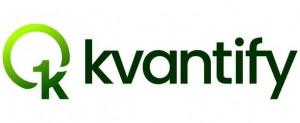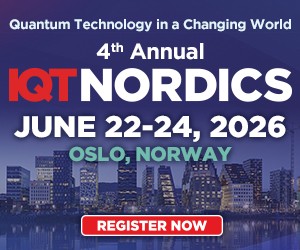Quantum News Briefs July 4: Bechtle IT Bonn/Cologne announces reseller agreement with IQM Quantum Computers • Kvantify raises $10.8M in seed funding to propel quantum drug discovery in Denmark • The next AI wave: Quantum AI • Mysterious export controls on quantum computers enacted by multiple nations

News Briefs:
Bechtle IT Bonn/Cologne announces reseller agreement with IQM Quantum Computers
 The Bechtle IT system house Bonn/Cologne announced July 4 it has signed a reseller agreement with IQM Quantum Computers (IQM), a global leader in building quantum computers.
The Bechtle IT system house Bonn/Cologne announced July 4 it has signed a reseller agreement with IQM Quantum Computers (IQM), a global leader in building quantum computers.
The partnership will enable Bechtle to sell IQM Spark, an on-premises 5-qubit superconducting quantum computer, which is in demand as universities, research laboratories, and industries adopt quantum computing. IQM Spark has been already deployed to end-uses, including the VTT Technical Research Centre of Finland and the Leibniz Supercomputing Centre in Germany.
With this agreement, Bechtle becomes the first reseller partner for IQM Spark and will provide sales and support for customers. Germany’s largest IT system house wants to further strengthen its competence team for quantum technology at the Bonn site. Additionally, technical engineers are already being trained at the IQM Academy to install, service, and provide maintenance support for end users of IQM Spark.
Kvantify raises $10.8M in seed funding to propel quantum drug discovery in Denmark
Kvantify, a leading quantum software start-up based in Denmark, has announced the successful closure of a €10 million (~US$10.8 million) seed round according to the June 3 news release.. This funding will enable Kvantify to strengthen its position in quantum computing, with an initial focus on developing applications for the life science sector.
The investment will accelerate the development of Kvantify’s innovative solutions that aim to leverage quantum computing to address complex problems in drug discovery and beyond. It will also boost the further development of quantum algorithms for chemical simulation, expanding their applicability across various industries.
The seed round is notable not only for its substantial size but also for the strategic match of the new investors to Kvantify’s mission. It is led by Danish VC Dreamcraft, together with biotech investor Lundbeckfonden BioCapital and the private investment company 2degrees. Other notable investors include international sector-focused tech investor Redstone VC, Danish lead quantum VC 2xN as well as EIFO.
In Other News:
MeriTalk column on “The next AI wave: Quantum AI”
 MeriTalk, the publication dedicated to improving the outcomes of government IT, hosted an article on quantum AI by Dr. James Matney, Vice President, Defense Strategy, General Dynamics Information Technology (GDIT), who opens his essay saying, “Amid all of the (well-placed) excitement around artificial intelligence, quantum AI is an emerging field that combines the power of quantum computing with AI to create new and innovative solutions for an array of complex problems.”
MeriTalk, the publication dedicated to improving the outcomes of government IT, hosted an article on quantum AI by Dr. James Matney, Vice President, Defense Strategy, General Dynamics Information Technology (GDIT), who opens his essay saying, “Amid all of the (well-placed) excitement around artificial intelligence, quantum AI is an emerging field that combines the power of quantum computing with AI to create new and innovative solutions for an array of complex problems.”
Though it is in its early stages, quantum AI has the potential to revolutionize many industries, and the learnings from early industry pilots hold tremendous insights for agencies.
Related: IQT Quantum + AI Event in NYC October 29-30
Matney also warns that it’s important to remember that quantum AI is not just about the technology itself. It also requires a skilled workforce capable of developing AI algorithms that can take advantage of the exponential increase in power that quantum computers bring.” This is why today GDIT is actively working with universities and quantum technology companies on software skill development for developers and applying quantum AI techniques to solve real customer use case.”
New Scientist discusses ‘Mysterious export controls on quantum computers enacted by multiple nations”
 Secret international discussions have resulted in governments across the world imposing identical export controls on quantum computers, while refusing to disclose the scientific rationale behind the regulations as per Matthew Sparkes in his July 3 article in New Scientist.
Secret international discussions have resulted in governments across the world imposing identical export controls on quantum computers, while refusing to disclose the scientific rationale behind the regulations as per Matthew Sparkes in his July 3 article in New Scientist.
The Wassenaar Arrangement is a system adhered to by 42 participating states, including EU members, the UK, the US, Canada, Russia, Australia, New Zealand and Switzerland, that sets controls on the export of goods that could have military applications, known as dual-use technologies. Canada has also implemented identical wording on 34 qubits into a quantum computer export ban.
New Scientist wrote to dozens of Wassenaar states asking about the existence of research on the level of quantum computer that would be dangerous to export, whether that research has been published and who carried it out. Only a few responded.
Christopher Monroe, who co-founded quantum computer company IonQ, says people in the industry have noticed the identical bans and have been discussing their criteria, but he has no information on where they have come from.













